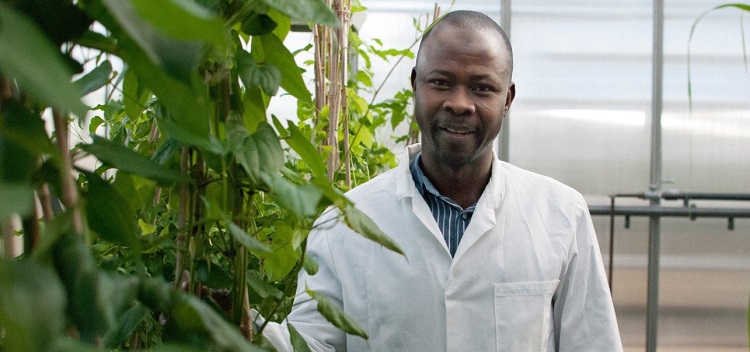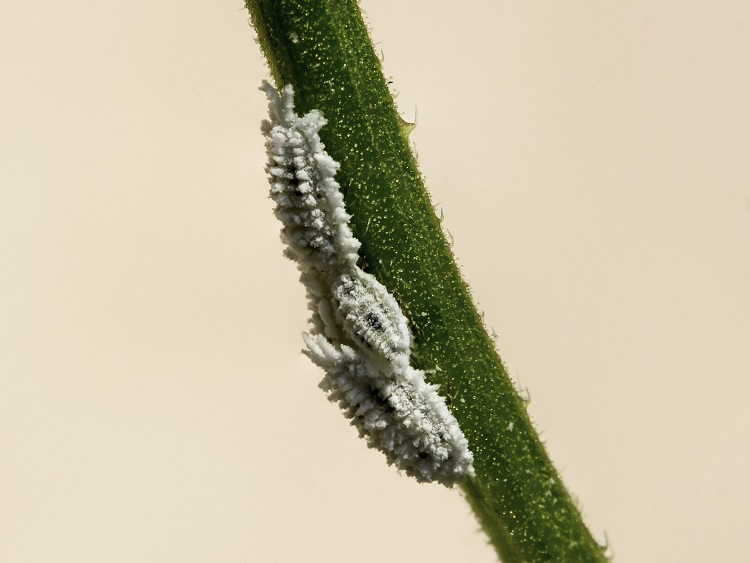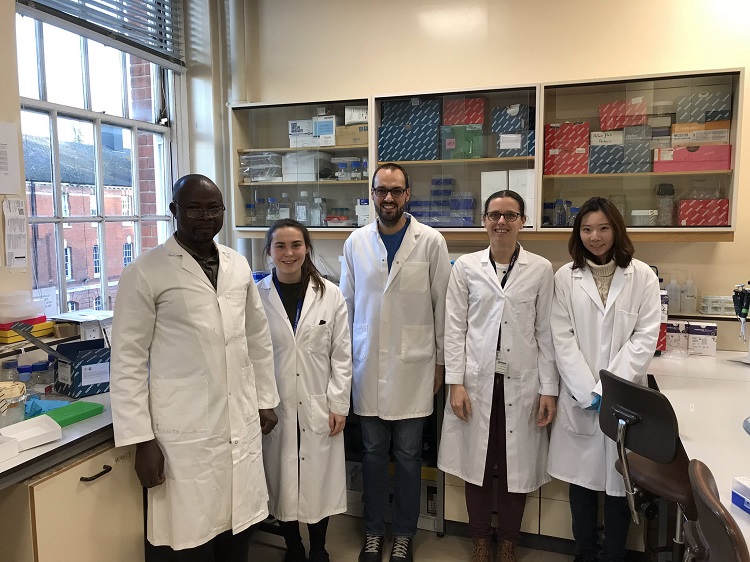NRI alumnus Dr Aliyu A Turaki, a senior lecturer at Kebbi State University of Science & Technology in Nigeria, returned to NRI on 9th December on a visit as part of a research collaboration and to give a seminar entitled ‘Identifying mealybug species affecting yam crops across northern Nigeria’. Turaki credits NRI for laying the foundations for his successful career in the department of crop production at the Nigerian University. He says that studying at NRI for his PhD transformed his life, and he took five minutes out of his busy schedule to talk to NRI Communications Officer, Linden Kemkaran.
“My specialist subject is molecular biology, the branch of biology that deals with molecular composition and interactions at the cellular level. In particular, I study plant viruses in agricultural settings, focusing on crop protection. Viruses  are a group of micro-organisms that are very difficult to deal with because they are spread by vectors, organisms that do not cause disease, but which spread infection by conveying pathogens from one host to another. Mealybugs are both a pest in their own right, and a vector for transmitting viruses.
are a group of micro-organisms that are very difficult to deal with because they are spread by vectors, organisms that do not cause disease, but which spread infection by conveying pathogens from one host to another. Mealybugs are both a pest in their own right, and a vector for transmitting viruses.
Mealybugs are sap-feeding insects that infest a wide range of plants. With cocoa and yams, mealybugs damage the plants in two ways: they bite the crops and suck the sap from them, meaning the crops can’t be used for production and they also transmit viruses. If mealybugs feed on an infected plant, they take the virus with them and when they go to the next healthy plant, they transmit the virus to it.
It’s always a pleasure to return to NRI. I got my PhD here which set me on my current path, but it wasn’t all straightforward! When I initially came to NRI, I was offered a place on the MSc Food Safety and Quality Management, but I had already gained my Master’s back in Nigeria. I presented my case to the Director of NRI, Professor Andrew Westby, and I must have done a good job because he agreed to put me through some tests to see if I was capable of undergoing PhD studies. So I did a thorough presentation and I was allowed to begin a PhD at NRI.
 Now, working closely with Nigerian farmers, I’m able to help them identify which type of mealybug is targeting their crops. There are about 20,000 species of mealybug, but there is currently no comprehensive research programme addressing it in Nigeria. To have a control strategy you need to know which types of mealybugs are present and which will have the capacity to transmit a virus, and which ones are simply pests. Scientists can establish a control strategy either by host resistance, for example by developing a gene in the yams so that they are able to resist any attack from mealybugs, or by designing a bio-pesticide - a pest-control substance made from natural, biodegradable products or micro-organisms - in order to reduce the use of chemical pesticides in the field.
Now, working closely with Nigerian farmers, I’m able to help them identify which type of mealybug is targeting their crops. There are about 20,000 species of mealybug, but there is currently no comprehensive research programme addressing it in Nigeria. To have a control strategy you need to know which types of mealybugs are present and which will have the capacity to transmit a virus, and which ones are simply pests. Scientists can establish a control strategy either by host resistance, for example by developing a gene in the yams so that they are able to resist any attack from mealybugs, or by designing a bio-pesticide - a pest-control substance made from natural, biodegradable products or micro-organisms - in order to reduce the use of chemical pesticides in the field.
Currently, farmers in Nigeria only use chemical pesticides which are very dangerous, and because they don’t know how to formulate a correct pesticide ratio, they effectively ‘carpet-bomb’ the crops with toxic chemicals just to wipe out the mealybugs. A mealybug infestation brings multiple problems for farmers; damaged crops mean a low yield so the farmers don’t get enough money to put food on their own table, and it also affects the coming year because most farmers use the seeds they have harvested to plant in the next season, so if the viruses are in the seeds, and if they’re taken to another season, the yield keeps on decreasing.
My team and I are so grateful to NRI for helping us to get where we are today, even though the journey was bumpy at times. In 2008, we had an interruption due to funding issues which took us about two years to sort out. Between NRI, the embassy and the Nigerian government, the issue was finally sorted in 2010 and my colleagues and I made plans to return to the UK but I was the only one whose visa didn’t come through in time which was ironic as I had been nominated as team leader! It was eventually sorted out, my visa came through and I was able to finish my PhD studies. I would like to give special thanks to Susan Seal, Professor of Molecular Biology, who leads NRI’s Molecular Virology and Entomology Research Group, for helping me every step of the way.
NRI allowed me to give the best of myself. If you show them what you have, then they will encourage you to realise your dreams; that is what NRI has done for me and my  colleagues.”
colleagues.”
To find out more about:
NRI Molecular Virology and Entomology Research Group


